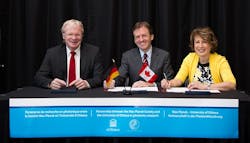University of Ottawa to house third Max Planck Centre in North America
The University of Ottawa (Ottawa, ON, Canada) is proud to announce a formal partnership with the Max Planck Society that will establish the Max Planck-University of Ottawa Centre for Extreme and Quantum Photonics. The centre will link two of the world's foremost research teams in the field of photonics and be only the third Max Planck Centre in North America.
RELATED ARTICLE: Photonics21 releases roadmap to photonics research and innovation priorities
Allan Rock, University of Ottawa president, was joined by Mona Nemer, vice-president, research, and Ferdi Schüth, vice-president of the Max Planck Society, in the recently inaugurated Advanced Research Complex for the signing of a memorandum of understanding (MOU) that will put in motion an ambitious research program.
"The University of Ottawa research community is honoured to be part of this historic partnership. The University and the Max Planck Society are both internationally renowned for research excellence in photonics. Deepening our ties means we will foster greater scientific exchange, produce highly qualified people and develop solutions to real-world problems," said uOttawa's Nemer.
The new centre will be at the forefront of research in photonics and optics, in activities such as the development of very high intensity laser sources, a quintessential technology for future advanced manufacturing processes, optical methods for quantum information science for use in secure data transmission over optical fiber systems, and the fabrication of devices for use in classical and quantum photonics. However, the cornerstone of this partnership will be to provide young researchers with international exchanges between Canada and Germany, giving them the opportunity to explore different scientific cultures early on in their professional development.
The principal investigators from the University of Ottawa in the new Max Planck-University of Ottawa Centre will be Professor Paul Corkum, National Research Council-Canada research chair in attosecond photonics, Professor Robert Boyd, Canada excellence research chair in quantum nonlinear optics, and Pierre Berini, University research chair in surface plasmon photonics.
The principal researchers from the Max Planck Institute for the Science of Light include Professor Gerd Leuchs, director, optics and information, Professor Philip Russell, director, photonic crystal fibers and Professor Vahid Sandoghdar, director, nano-optics.
The Max Planck Society for the Advancement of Science is considered the foremost basic research institution in Germany. It is named after the Nobel Prize-winning German physicist considered to be the founder of the quantum theory. Since its establishment in 1948, more than 18 Nobel laureates have emerged from the ranks of its scientists.
The University of Ottawa is home to an outstanding team of experts in the area of photonics and optics research, as evidenced by our numerous research chairs and awards, including a prestigious Canada Excellence Research Chair, and ten Canada Research Chairs in photonics. The University boasts state-of-the-art research facilities, and over the past several years, our distinctions have also included the Harvey Prize, the Humboldt Research Award, the Gerhard Herzberg Canada Gold Medal for Science and Engineering and the King Faisal International Prize for Science.
SOURCE: University of Ottawa; http://www.uottawa.ca/media/media-release-3195.html

Gail Overton | Senior Editor (2004-2020)
Gail has more than 30 years of engineering, marketing, product management, and editorial experience in the photonics and optical communications industry. Before joining the staff at Laser Focus World in 2004, she held many product management and product marketing roles in the fiber-optics industry, most notably at Hughes (El Segundo, CA), GTE Labs (Waltham, MA), Corning (Corning, NY), Photon Kinetics (Beaverton, OR), and Newport Corporation (Irvine, CA). During her marketing career, Gail published articles in WDM Solutions and Sensors magazine and traveled internationally to conduct product and sales training. Gail received her BS degree in physics, with an emphasis in optics, from San Diego State University in San Diego, CA in May 1986.
